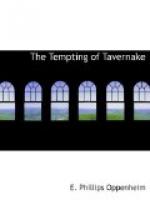“But you are sacrificing yourself!” he declared. “I will keep your father.”
“It isn’t that only,” she replied. “For one thing, I couldn’t let you; and for another, it isn’t only the money, it’s the work. As long as he’s made to think that the public expect him every night, he keeps off drinking too much. There is nothing else in the whole world which would keep him steady. Don’t look as though you didn’t understand, Leonard. He is my father, you know, and there isn’t anything more terrible than to see any one who has a claim on us give way to anything like that. You mayn’t quite approve, but please believe that I am doing what I feel to be right.”
The little fire had gone out. Beatrice glanced at the clock and put on her jacket again.
“I am sorry, Leonard,” she said, “but I think I must go and fetch father now. You can walk with me there, if you will. It has been very good to see you again. For the rest I don’t know what to say to you. Do you think that it is quite what you were meant for—to build boats?”
“I don’t seem to have any other ambition,” he answered, wearily. “When I read in the paper this morning that you and your father were here, things seemed suddenly different. I came at once. I didn’t know what I wanted until I saw you, but I know now, and it isn’t any good.”
“No good at all,” she declared cheerfully. “It won’t be very long, Leonard, before something else comes along to stir you. I don’t think you were meant to build boats all your life.”
He rose and took up his hat. She was waiting for him at the door. Again they passed down the narrow street.
“Tell, me, Beatrice,” he begged, “is it because you don’t like me well enough that you won’t listen to what I ask?”
For a moment she half closed her eyes as though in pain. Then she laughed, not perhaps very naturally. They were standing now by the door of the public house.
“Leonard,” she said, “you are very young in years but you are a baby in experience. Mind, there are other reasons why I could not—would not dream of marrying you, other reasons which are absolutely sufficient, but—do you know that you have asked me twice and you have never once said that you cared, that you have never once looked as though you cared? No, don’t, please,” she interrupted, “don’t explain anything. You see, a woman always knows—too well, sometimes.”
She nodded, and passed in through the swinging-doors. Standing out there in the narrow, crooked street, Tavernake heard the clapping and applause which greeted her entrance, he heard her father’s voice. Some one struck a note at the piano—she was going to sing. Very slowly he turned away and walked down the cobbled hill.
CHAPTER IV
PRITCHARD’S GOOD NEWS
Late in the afternoon of the following day, Ruth came home from the village and found Tavernake hard at work on his boat. She put down her basket and stopped by his side.




